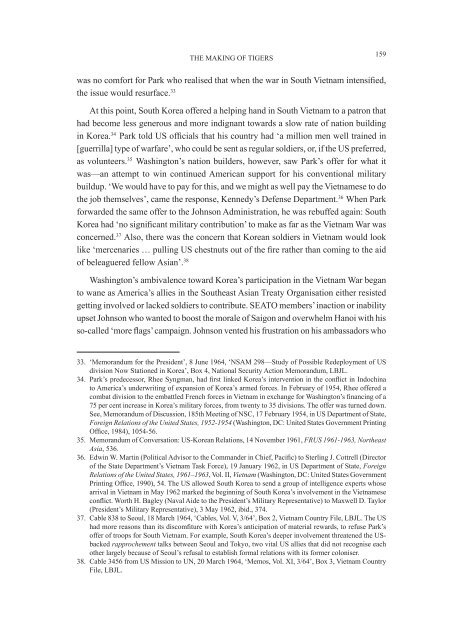conference proceedings - Australian Army
conference proceedings - Australian Army
conference proceedings - Australian Army
You also want an ePaper? Increase the reach of your titles
YUMPU automatically turns print PDFs into web optimized ePapers that Google loves.
THE mAKING OF TIGERS<br />
was no comfort for Park who realised that when the war in South Vietnam intensified,<br />
the issue would resurface. 33<br />
At this point, South Korea offered a helping hand in South Vietnam to a patron that<br />
had become less generous and more indignant towards a slow rate of nation building<br />
in Korea. 34 Park told US officials that his country had ‘a million men well trained in<br />
[guerrilla] type of warfare’, who could be sent as regular soldiers, or, if the US preferred,<br />
as volunteers. 35 Washington’s nation builders, however, saw Park’s offer for what it<br />
was—an attempt to win continued American support for his conventional military<br />
buildup. ‘We would have to pay for this, and we might as well pay the Vietnamese to do<br />
the job themselves’, came the response, Kennedy’s Defense Department. 36 When Park<br />
forwarded the same offer to the Johnson Administration, he was rebuffed again: South<br />
Korea had ‘no significant military contribution’ to make as far as the Vietnam War was<br />
concerned. 37 Also, there was the concern that Korean soldiers in Vietnam would look<br />
like ‘mercenaries … pulling US chestnuts out of the fire rather than coming to the aid<br />
of beleaguered fellow Asian’. 38<br />
Washington’s ambivalence toward Korea’s participation in the Vietnam War began<br />
to wane as America’s allies in the Southeast Asian Treaty Organisation either resisted<br />
getting involved or lacked soldiers to contribute. SEATO members’ inaction or inability<br />
upset Johnson who wanted to boost the morale of Saigon and overwhelm Hanoi with his<br />
so-called ‘more flags’ campaign. Johnson vented his frustration on his ambassadors who<br />
33. ‘memorandum for the President’, 8 June 1964, ‘NSAm 298—Study of Possible Redeployment of US<br />
division Now Stationed in Korea’, Box 4, National Security Action memorandum, LBJL.<br />
34. Park’s predecessor, Rhee Syngman, had first linked Korea’s intervention in the conflict in Indochina<br />
to America’s underwriting of expansion of Korea’s armed forces. In February of 1954, Rhee offered a<br />
combat division to the embattled French forces in Vietnam in exchange for Washington’s financing of a<br />
75 per cent increase in Korea’s military forces, from twenty to 35 divisions. The offer was turned down.<br />
See, memorandum of Discussion, 185th meeting of NSC, 17 February 1954, in US Department of State,<br />
Foreign Relations of the United States, 1952-1954 (Washington, DC: United States Government Printing<br />
Office, 1984), 1054-56.<br />
35. memorandum of Conversation: US-Korean Relations, 14 November 1961, FRUS 1961-1963, Northeast<br />
Asia, 536.<br />
36. Edwin W. Martin (Political Advisor to the Commander in Chief, Pacific) to Sterling J. Cottrell (Director<br />
of the State Department’s Vietnam Task Force), 19 January 1962, in US Department of State, Foreign<br />
Relations of the United States, 1961–1963, Vol. II, Vietnam (Washington, DC: United States Government<br />
Printing Office, 1990), 54. The US allowed South Korea to send a group of intelligence experts whose<br />
arrival in Vietnam in may 1962 marked the beginning of South Korea’s involvement in the Vietnamese<br />
conflict. Worth H. Bagley (Naval Aide to the President’s Military Representative) to Maxwell D. Taylor<br />
(President’s military Representative), 3 may 1962, ibid., 374.<br />
37. Cable 838 to Seoul, 18 march 1964, ‘Cables, Vol. V, 3/64’, Box 2, Vietnam Country File, LBJL. The US<br />
had more reasons than its discomfiture with Korea’s anticipation of material rewards, to refuse Park’s<br />
offer of troops for South Vietnam. For example, South Korea’s deeper involvement threatened the USbacked<br />
rapprochement talks between Seoul and Tokyo, two vital US allies that did not recognise each<br />
other largely because of Seoul’s refusal to establish formal relations with its former coloniser.<br />
38. Cable 3456 from US mission to UN, 20 march 1964, ‘memos, Vol. XI, 3/64’, Box 3, Vietnam Country<br />
File, LBJL.<br />
159

















